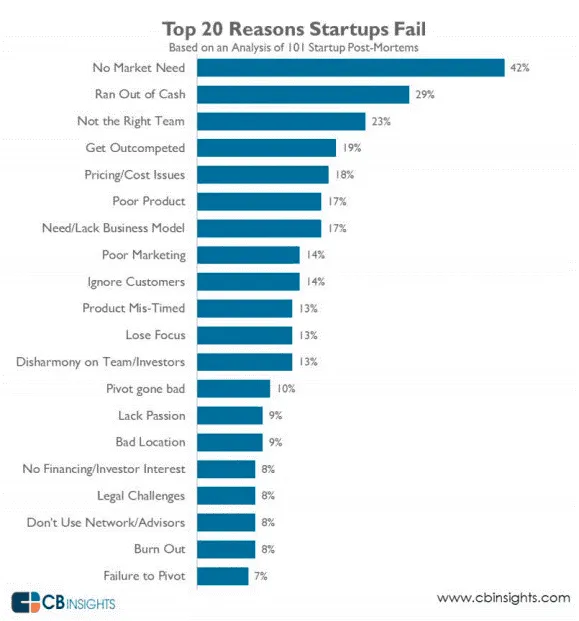Excited about an idea and wish to start up? Step back and take time to do your research
Avoid entrepreneurial myopia when struck by an idea that has you mesmerised. There is more to starting up than the idea and early adoption may not always result in a billion-dollar business.

Image credit: EVC Ventures
Did you know about 50 percent of all new businesses get through only five years or more, and about a third cling to 10 years and above? Scary, right?
In this fast-paced world, every individual strives to be on the top and in the very haze, the idea of quick learning takes a turn to failure. Early adopters! The term defines many of us today. Are you someone who lays your hands on every new gadget that is launched in the market? Or are you among the ones who believe in their intuition and rank among the first few buyers of new products? If you see your reflection in any of these, you know exactly what I am talking about.
Following the pattern, I see many startups jumping into the business world as early adopters. Is it a good thing? That depends on whether you're playing a monopoly game in the market with the right strategies implemented. Look where Flipkart went after Walmart played God by acquiring 77 percent of its stakes earlier this month. But how many more Flipkarts can we see tomorrow?
New ventures and early adopters
Opportunities exist in every sector and are often dominated by factors like new knowledge, demographic change, inventions, advancements in technologies artificial intelligence (AI), augmented reality/virtual reality AR/VR, and what not. While one can blame improper execution or inadequate resources for the failure of a new venture, early adoption and lack of smart study are less talked about yet powerful reasons behind such failures.

Now, the question is why? Today, everyone wants to win. Where one venture is opting for elastic logistics to provide its customers with a never-had-before experience, the other one is all set to take on-demand economy by the lightning storm. Big boys like Postmates and Uber have taught new lessons on business to many aspiring entrepreneurs. Do you think early adoption would’ve helped them rise in the realm of business? I believe not agreeing to the same seems fair after all.
Here are some tips an entrepreneur must keep in mind before jumping in the blurry yet fortunate world of business.
Your business is your own reflection
Imagine yourself sitting in a nice coffee shop on a May Day morning and you simply can’t help feeling mesmerised by the way the café is set up. In the fraction of a second you know you want to open your own coffee shop. Dreamy, isn’t it?
Now imagine yourself sitting in the same coffee shop another day and watching customers incensed, counting one or the other flaw in the same setup. Did you just drop the dreamy business idea now? That is how the new startups show up in the world of business every day and end up falling even before walking a mile in the shoes of business giants.
Ergo, it is crucial to be sure about the dos and don'ts of the venture that keep crossing your mind. Research and know about all the decisive factors, like your business plan, market size, competitors, customers, revenue model, the right management team, go-to-market strategies, when to take on an investor, and Plan B (if it pivots with time). Still planning on starting the next unicorn? Then I wish you luck.
Research it extensively
I believe conducting an extensive research before execution of any business idea/plan is mandatory. At times, when I speak to founders of different startups, they end up balking at the idea of studying their competitors extensively, implementing different market strategies at different phases, executing Plan B, P&L accountability etc., making me wonder how they will stand the storm in their coming days.
Before execution, one must come up with a cohesive timeline along with a sampling plan. To do the same, opting for the right kind of research methodology is of utmost importance. For instance, persistently listening to the sounds of the marketplace is a good start.

Trust me, there is no rocket science involved. If you don’t know the market, you won’t sell, simple! I came across a report which said, 42 percent of the startups fail due to the lack of market research.

Heard of Streetbees? The market players like PepsiCo and Unilever are no more relying on the traditional market research methods. They are happy with Streetbees, where real people are paid to click pictures and make videos of the related products and services to ensure that the businesses know the on-going market trends. Seems like a plan, doesn’t it?
Know the risks
Risk is perceived, and so is a psychological construct. Many of us think that involvement of risk can be unfavorable. However, the success rates of many risk-involving businesses indicate the opposite. Notwithstanding, risk, after studying about a venture in depth and noticing how flaws can be turned around for good, makes more sense. Just the introduction of the new technology in the market should not lure an entrepreneur to incorporate it without thoroughly researching it and acknowledging the possible benefits it can bring. Having said that, coming to bat more often till the time you know the field by bones is surely a good idea.
The bottom line...
As an entrepreneur, early adoption must be a way to ‘intelligence gathering’. Constantly challenging the ‘entrepreneurial myopia’, narrowing down the idea of defining business and viewing it as a relatively fixed term is the need of the hour. Instead of constantly trying to catch up with the market that is trending, I encourage that entrepreneurs should study the market thoroughly, use cutting-edge technologies, make a robust plan, and seek the right mentorship that will ensure a higher chance of success in more ways than one.
(Disclaimer: The views and opinions expressed in this article are those of the author and do not necessarily reflect the views of YourStory.)







